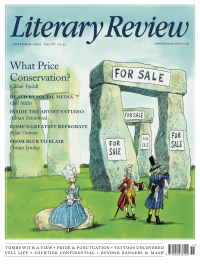Peter Davidson
The Poet’s Eye
Starlight Wood: Walking Back to the Romantic Countryside
By Fiona Sampson
Corsair 356pp £20
There are three strands to Fiona Sampson’s Starlight Wood. The first is place writing, with the author recording walks in very diverse British landscapes: upland Wales, the Kintyre peninsula, the shingle beach at Aldeburgh. The second consists of reflections on the work of her father, who was an artist, and recollections of him and of family holidays and travels. His drawings, delightful topographies in the manner of the mid-20th-century ‘Recording Britain’ artists, are reproduced at the beginning of each chapter. The third strand, not always as successful as the others, involves reflections on writers and painters of the Romantic period, broadly defined, and their various relations to the British landscape.
The book’s subtitle, ‘Walking Back to the Romantic Countryside’, might lead the reader to expect a whole book of focused topographies, perhaps following Blake’s disciples, the ‘Ancients’, through what they called ‘the valley of vision’ at Shoreham in Kent or tracking Dorothy Wordsworth along the shores and slopes of the Lake District. The reader might also expect Sampson to attempt to trace how landscapes have changed over time. There are, it is true, one or two such evocations – for instance, a finely judged description of modern Dedham Vale shimmering into pastness:
It could be an eighteenth-century landscape, and it feels as though the walkers ahead and behind us are resuming something left off not just for a few months, but centuries ago … To feel yourself figuring in a landscape you’ve known all your life (but never visited) is like stepping into the frame of a picture. Below the low horizon, small figures move to and fro. Above, the wide sky is uncertain blue … halfway between violet and cornflower.
Sampson also evokes the sad remains of the past in the present in a description of the once-famous ‘picturesque’ estate of Hafod Uchtryd in Wales:
Here kids crowd wooden picnic tables, and car boots stand open to air dogs, in a cheerful welter of noise and movement. This is

Sign Up to our newsletter
Receive free articles, highlights from the archive, news, details of prizes, and much more.@Lit_Review
Follow Literary Review on Twitter
Twitter Feed
Literary Review is seeking an editorial intern.
Though Jean-Michel Basquiat was a sensation in his lifetime, it was thirty years after his death that one of his pieces fetched a record price of $110.5 million.
Stephen Smith explores the artist's starry afterlife.
Stephen Smith - Paint Fast, Die Young
Stephen Smith: Paint Fast, Die Young - Jean-Michel Basquiat: The Making of an Icon by Doug Woodham
literaryreview.co.uk
15th-century news transmission was a slow business, reliant on horses and ships. As the centuries passed, though, mass newspapers and faster transport sped things up.
John Adamson examines how this evolution changed Europe.
John Adamson - Hold the Front Page
John Adamson: Hold the Front Page - The Great Exchange: Making the News in Early Modern Europe by Joad Raymond Wren
literaryreview.co.uk